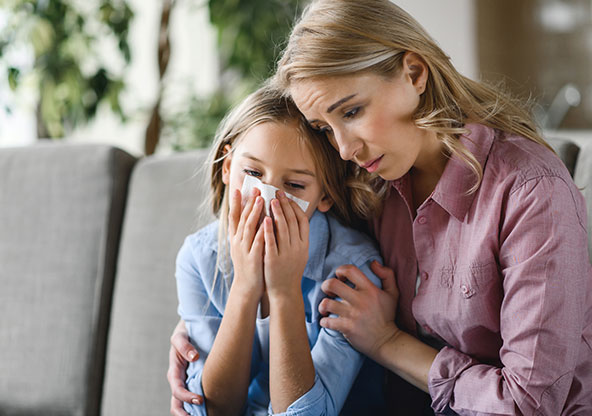How Long Does the Flu Vaccine Last?

Our providers answer your questions about the flu vaccine.
The flu vaccine, also known as the influenza vaccine, is a medication that helps protect people from the flu. It is given by injection into the arm or sometimes into the thigh muscle in adults and children over six months old.
The vaccine does not contain any live viruses, so it cannot cause the flu. A person receives it through an injection in their arm or shoulder muscle. With flu season upon us, the flu vaccine is an effective defense to combat the virus.
Does the flu vaccine make you sick?
The particles of the virus used in the flu vaccine are not active and cannot give you the flu.
Sometimes, people are exposed to other illnesses when they visit their doctor's office to get the vaccine or go about their daily lives during the time of year when respiratory illnesses are going around. But, again, this is not due to the vaccine.
Do I need to get a flu vaccine every year, or if I've already had the flu?
Yes. The flu shot only lasts one flu season. That means you need a flu shot every year. The flu is a very tricky virus that has learned to change its makeup so that people's immune systems can't recognize it. This allows it to infect more people.
Every year, several types of flu float around, so it's best to get as much protection as possible and still get the vaccine even if you already have the flu.
The U.S. Centers for Disease Control and Prevention suggests that those over six months get the flu vaccine.
Related Content
Does the flu vaccine work?
The vaccine is our best chance to keep our kids from getting the flu, but it isn't always 100 percent effective.
Scientists do their best every year to determine how the virus will change and make a vaccine to fight it, but they aren't always able to do that as well as we would like. As a result, we see large outbreaks when this happens.
Flu vaccines can help reduce your risk of picking up the virus that causes the flu, which is what often leads to ear infections and sinusitis. So a flu vaccination can help prevent ear infections and prevent sinusitis.
Does the flu vaccine give you the flu?
The flu vaccine does not give you the flu. Because the flu vaccine is made of a killed or inactive flu virus, it cannot cause infection.
If you get sick after the flu vaccine, it is either your body's immune response to the vaccine or symptoms of another virus (that you probably picked up when you went to the doctor!).
Is it too late to get the flu vaccine?
It is always possible to get the flu vaccine. However, every year flu infections have different patterns in circulation. The peak for flu disease is usually between December and March, but it can even go until May.
Also, if you get the flu, you should still get the shot because there are two types, A and B, and it would be miserable to get both flu A and B in the same season.
Still Need a Flu Shot?

Find an urgent care near you to get your vaccine or schedule a visit with your primary care provider.
Get Care NowAre some people not allowed to get the flu vaccine?
Children under six months of age and those with a history of a severe allergic reaction (anaphylaxis) to the vaccine or egg protein must rely on those around them to get the flu vaccine to protect them from contracting the disease.
All children older than six months who don't have this risk should receive a flu vaccine every year. The first time it is given, the child needs two doses given one month apart.
Do I need to get the flu vaccine every year if I'm healthy?
The CDC currently recommends everyone over the age of six months get the flu vaccine every year. However, even healthy people should get vaccinated.
Because your immunity decreases over the 12 months since your last flu vaccine, yearly vaccination gives you the best protection. In addition, the flu virus mutates yearly, so the annual flu vaccine protects you against the strains that are more likely to cause infection this season.
Why do we get sicker in the winter?
There are several reasons why people tend to experience more illness in the winter months than during warmer times of the year. One reason health care experts cite is that colder temperatures lead to drier air, which can cause our mucous membranes to become irritated and inflamed.
Many people spend more time indoors during the winter months. As a result, they may be exposed to more germs and viruses that can cause illness.
How Serious is Influenza?

Should you still be concerned about the flu, and how serious is it? Find answers here.
Read MoreMore Articles About Winter Illnesses View More
 When to Take a Baby with RSV to the Hospital?
When to Take a Baby with RSV to the Hospital?
 Stages of the Common Cold
Stages of the Common Cold
 3 Ways to Relieve a Stuffy Nose
3 Ways to Relieve a Stuffy Nose
 How Serious Is Influenza and How Does the Flu Spread?
How Serious Is Influenza and How Does the Flu Spread?
 How Long Does the Flu Vaccine Last?
How Long Does the Flu Vaccine Last?
